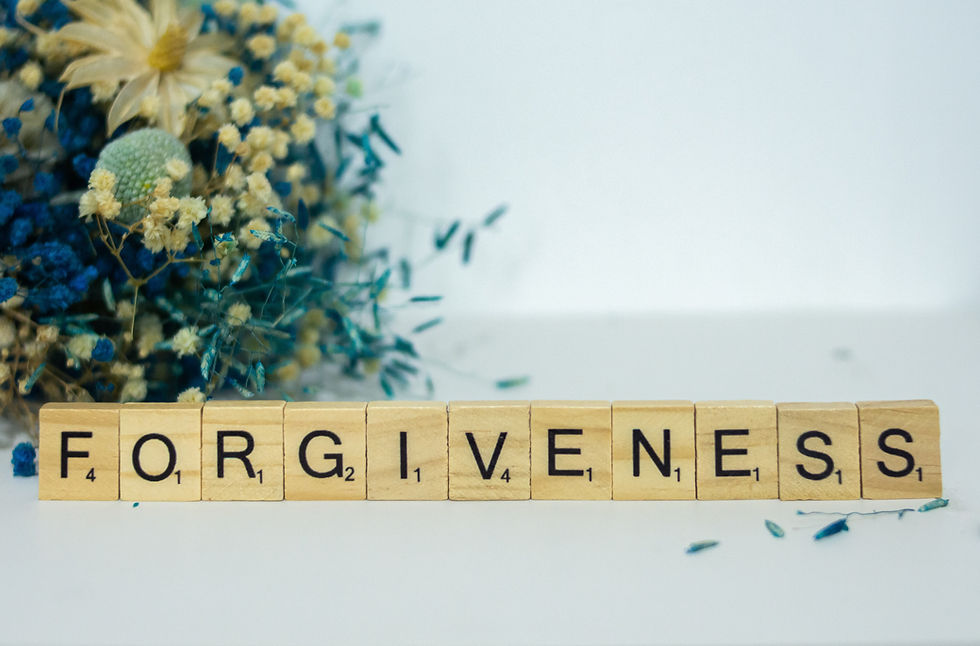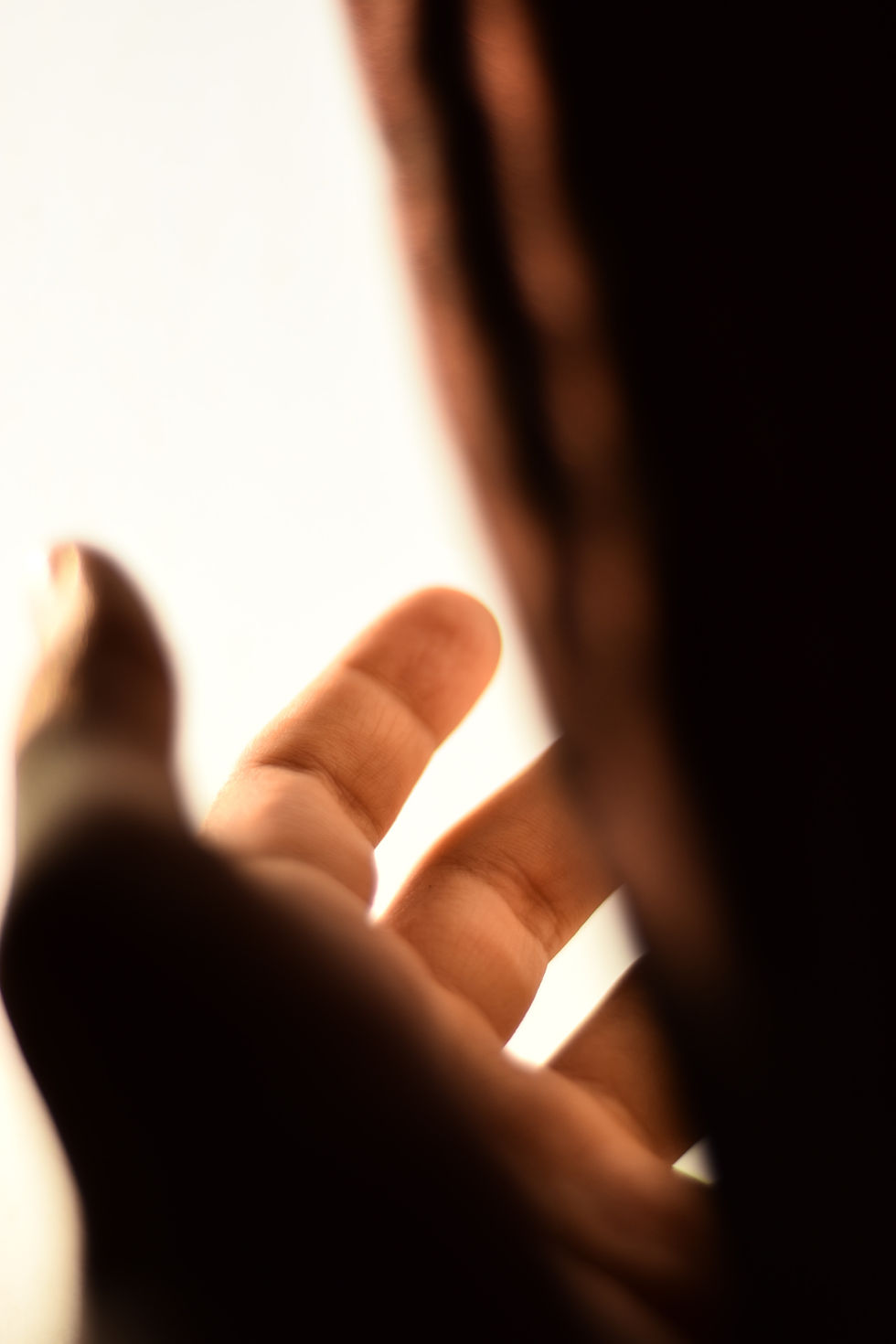Forgiveness as Freedom: Practical Tools for Healing
- Kayla M. Sweet, MA

- May 23, 2025
- 7 min read
Forgiveness has played a pivotal role in my personal journey, serving as a guiding light through some of life’s darkest moments. At the tender age of four, I experienced an unimaginable loss: the death of my father to suicide. This tragic event not only shattered my childhood innocence but also left an indelible mark on my heart and mind.

I grew up with the what-ifs, with the ache of a father-shaped absence in my life. But even harder than the grief was the quiet and persistent anger. Anger at him for leaving. Anger at a world that didn’t offer him the kind of support he needed to stay. And if I’m being honest, anger at myself for not being enough to make him want to live.
That anger seeped into the background of my life. It showed up in my relationships, in my nervous system, in the way I carried responsibility for everyone’s wellbeing. It shaped my identity in ways I couldn’t even see at the time.
But over the years, through therapy, spiritual healing, leadership work, and deeply personal reflection, one thread continued showing up: forgiveness.
Forgiveness wasn’t just a moral value I tried to uphold. It became a practice, a portal, a healing salve that softened my edges, brought clarity to my heart, and taught me how to lead, love, and live more fully.
This blog post is for anyone carrying resentment, grief, guilt, or anger toward someone else or toward themselves. It’s especially for those who want to forgive but don’t know how.

What Forgiveness Really Means
Let’s start by unraveling a common myth:
Forgiveness does not mean saying what happened was okay.
It doesn’t mean reconciling. It doesn’t mean pretending it didn’t hurt. And it doesn’t mean spiritually bypassing or suppressing real emotions.
Forgiveness means freeing yourself from the emotional weight of what happened so you can move forward with more peace, clarity, and wholeness.
According to Dr. Fred Luskin, director of the Stanford University Forgiveness Project, forgiveness is “the ability to make peace with the word 'no.'” It’s about making peace with what you didn’t get, what wasn’t said, what was lost, or what will never be.

Why Forgiveness Matters for Healing
Here’s what we know from the research:
Unforgiveness is a stress state. When we hold onto resentment, the body stays in a fight-or-flight response. This can increase cortisol, suppress immune function, and elevate the risk for anxiety, depression, and even chronic illness (Luskin, 2002; Mayo Clinic, 2023).
Forgiveness boosts emotional well-being. People who practice forgiveness experience lower levels of stress and depression, greater hope, improved self-esteem, and healthier relationships (Toussaint et al., 2014).
It even impacts your physical health. Studies have found that forgiveness practices can lower blood pressure, reduce pain, and improve sleep (Lawler et al., 2005).
Forgiveness is not a soft skill—it’s a life-changing psychological and physiological intervention.

How to Forgive: A Practical Approach
When I sat down with Katharine Giovanni, forgiveness coach and three-time award-winning author, on Internally Guided Life, I was again reminded how essential it is to value forgiveness and learn how to do it.
Katharine’s approach is rooted in lived experience: childhood trauma, breast cancer, and decades of personal healing. And out of all that came her step-by-step forgiveness method, which she now teaches around the world.
Her process includes:
Make a list of everyone (or everything) you feel resentment toward—including people, places, systems, and even parts of yourself.
Rate the emotional charge from 1–10, with 10 being most intense or hardest to forgive.
Start with the lower numbers (e.g., forgiving the barista who was rude) and work your way up to the heavier items.
Use visualization, such as imagining the person as a young child to invite compassion.
Say a mantra, such as: I forgive you. I forgive the energy around you. I forgive myself.
Repeat as needed. Forgiveness is not always a one-time act—it’s a process that may need revisiting.
She also teaches that you don’t have to forgive face-to-face. Forgiveness is about what you do in your own heart. It’s an internal, energetic shift—not a performance or a permission slip for harm.

Self-Forgiveness: The Hardest and Most Necessary Step
When I finally turned the work inward, toward the version of me who carried so much guilt, who thought she should’ve done more, been more, I found a deeper level of healing.
Many of us are walking around blaming ourselves for things we didn't know at the time, for mistakes we made in survival mode, or for things that were never ours to carry.
But here’s the truth:
You cannot hate yourself into healing.
Forgiveness is the first step toward truly seeing yourself with compassion. It’s how you begin to release shame. It’s how you start trusting your voice again. And it’s how you access joy without feeling like you need to earn it.

Signs You May Need to Do Forgiveness Work
Forgiveness isn’t just about who hurt you. It’s about noticing where your energy is still stuck in old pain.
Here are some signs that forgiveness work might be needed:
You replay past arguments in your head over and over.
You feel “activated” or bitter when someone’s name comes up.
You have difficulty trusting others or yourself.
You feel guilty or ashamed about a choice you made.
You’re stuck in a victim mindset or repeating unhealthy patterns.
You’re exhausted from carrying an emotional weight you can’t explain.
If any of those sound familiar, know that it doesn’t mean you’re broken. It means your nervous system and your spirit are trying to heal, and forgiveness is an important part of that process.

Integrating Forgiveness into Daily Life
You don’t need to overhaul your life to start forgiving. You just need to start noticing, naming, and making space.
Here are a few gentle practices to support your journey:
Nightly forgiveness journaling. Before bed, write down one thing you’re ready to forgive (big or small). Say it aloud. Repeat it gently.
Mirror work. Look at yourself in the mirror and say, “I forgive you. You did the best you could.”
Forgiveness walks. Take a walk while repeating a forgiveness mantra. Let nature hold your grief, anger, and release.
Breathwork and meditation. Use the breath to invite in compassion and exhale resentment. Insight Timer and other apps offer forgiveness meditations you can start today.

Forgiveness = Wisdom
As a coach and leader, I’ve learned that unprocessed resentment doesn’t just stay quiet; it bleeds into our communication, our boundaries, and how we relate to others.
When I began to truly forgive the people and systems that hurt me, I found I had more space to hold others without projecting. I could coach with clarity, speak with compassion, and lead from a place of grounded strength rather than hidden pain.
Forgiveness doesn’t make us weaker. It makes us wiser.

An Invitation
If you’re on your own forgiveness journey or ready to begin one, I hope you’ll listen to my conversation with Katharine Giovanni. It’s one of the most practical and down-to-earth interviews I’ve had the honor of sharing.
You’ll walk away with tools, truth, and the tender reminder that you are already worthy of peace.

Additional Resources on Forgiveness
Book: The Ultimate Path to Forgiveness by Katharine Giovanni – Buy here
Book: Forgive for Good by Dr. Fred Luskin
Research: Stanford Forgiveness Project – https://learningtoforgive.com
Free Guided Meditation: Try a forgiveness meditation on Insight Timer or YouTube
Support: Consider working with a coach or therapist if forgiveness brings up overwhelming emotions that you would like support in working through.
Final Words
Forgiveness is not about becoming perfect or pretending you’re over it.
It’s about reclaiming your life, your energy, and your power to love again, lead again, and live fully—on your terms.
You don’t have to wait for closure, you don’t need anyone else’s permission, and you don’t have to carry the weight any longer.
Your healing is waiting to be unlocked. And forgiveness might just be the key.
With Love,
Kayla

If you feel a calling to live a life filled with energy, balance, and a deep sense of purpose, I would love to connect with you. Imagine waking up each morning with a clear vision of what truly matters to you and the courage to express your authentic self. Let's take a moment together; schedule a free discovery call so we can explore the insights and tools that will help you reach your full potential and create a life that resonates with your heart.
I’m Kayla M. Sweet, MA, a Gallup-Certified Strengths Coach and the founder of Internally Guided Leadership Consulting LLC. I believe in the power of living in alignment with your strengths and values, and I’ve dedicated my career to helping heart-centered people do just that. With a BA in Psychology, an MA in Consciousness and Transformative Studies, and over a decade of experience in leadership, human resources, talent development, and mental health, I bring a unique blend of expertise and empathy to the work I do.
My approach is all about empowering you to reconnect with your strengths, trust your inner wisdom, and create a sense of balance that feels sustainable and true to who you are. You’re not broken, and you don’t need fixing. What you need is space to grow, support to navigate life’s transitions, and guidance to step into your worth with confidence.
If this resonates with you, I’d love for you to tune into the Internally Guided Life Podcast and schedule your discovery call today.
📝 Sources:
Luskin, F. (2002). Forgive for Good: A Proven Prescription for Health and Happiness. HarperOne.
Mayo Clinic Staff. (2023). Forgiveness: Letting Go of Grudges and Bitterness. https://www.mayoclinic.org
Lawler, K. A., Younger, J. W., Piferi, R. L., et al. (2005). A change of heart: Cardiovascular correlates of forgiveness in response to interpersonal conflict. Journal of Behavioral Medicine, 28(1), 1–13.
Toussaint, L., Owen, A. D., & Cheadle, A. (2014). Forgive to Live: Forgiveness, Health, and Longevity. Research in Journal of Behavioral Medicine.
Giovanni, K. (Guest), & Sweet, K. (Host). (2025, May 23). E37. The Healing Power of Forgiveness with Katharine Giovanni [Audio podcast episode]. In Internally Guided Life. Spotify. https://open.spotify.com/episode/29iNEPWVwDkZYjg2zJFdJZ




Comments